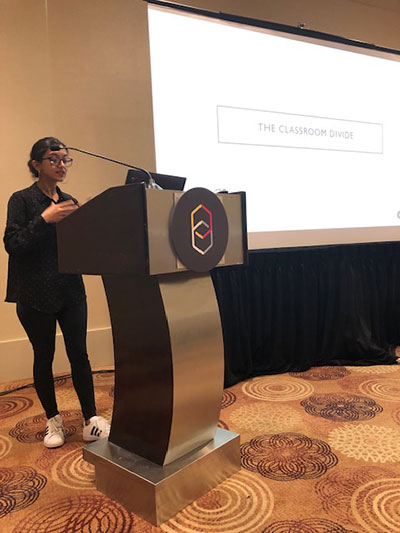Media faculty, students present at 2023 International Communication Association conference
 The College of Media was well represented at the 73rd annual International Communication Association conference this summer in Toronto, Canada, with many faculty and graduate students presenting on the theme of “Reclaiming Authenticity in Communication.” The ICA aims to advance the scholarly study of human communication by encouraging and facilitating excellence in academic research worldwide.
The College of Media was well represented at the 73rd annual International Communication Association conference this summer in Toronto, Canada, with many faculty and graduate students presenting on the theme of “Reclaiming Authenticity in Communication.” The ICA aims to advance the scholarly study of human communication by encouraging and facilitating excellence in academic research worldwide.
Media participants are listed below. View the ICA conference program.
Faculty session chairs and presentations
ICA Hackathon 2023
Chairs: Jacob Fisher, Yee Man Margaret Ng
System in the Context of COVID-19 Vaccines
Yee Man Margaret Ng
Using Conversational Agents to Correct Misinformation and Change Behavioral Intentions
Leona Yi-Fan Su
Feminist Media Studies Editorial Board Breakfast
Chair: Isabel Molina
Mediated Quinceañeras: Constructing a Public Facing Exhibit
Angharad Valdivia
Legitimate and Appropriate Science Communication: The Effects of Anthropomorphic and Satirical Humor on Source Likability
Leona Yi-Fan Su
Mobile Devices and Social Media
Ewa Maslowska
Experiencing Climate Change Virtually: A Pre-Registered Experiment on the Effects of Virtual Reality on Climate Change Related Cognitions, Emotions, and Behavior
Ewa Maslowska
Effects of Review Incentive Types on Review Writers, Content, and Readers
Ewa Maslowska
The Impact of Cognitive Load on Recognition for Health Narrative Information
Jacob Fisher
Faculty and student co-presentations
Context Matters: Teachers Talk Media Literacy in the Classroom
Sakshi Bhalla (pictured at top) and Michelle Nelson
Intentions: The Roles of Message Format, Information Source, and Perceived Credibility
Jennifer Shiyue Zhang, Ruochong Ji, Junqi Shao, Leona Yi-Fan Su
Exploring the Boundary Condition of the Proteus Effect: Improving Exercise Efficacy Using Immersive Technology
Chen Chen, Yanyun Wang, Yuki Minamii, Mike Yao
Gender Identity and Influence in Human-Machine Communication: A Mixed-Methods Exploration
Weizi Liu, Nisa Rahman, Mike Yao
An Initial Examination of the Role of Reward Proximity in Driving Attention during Media Processing
Chen Chen, Jacob Fisher
Making Social Cues Invisible: How the Absence of Public Dislike Counts Affects YouTube Users’ Behavior
Maggie Zhang, Yee Man Margaret Ng
What Is “Being There”? An Ontology of the Immersive Experience
Chen Chen, Jacob Fisher
Predicting Streaming Audiences for a Channel’s On-Demand TV Shows: Choice Architecture, Content Attributes, and Consumer Agency
Hritik Raj, Harsh Taneja
Time Perception, Cognitive Load, and Memory for Short Form Video Applications (SVAs)
Veranika Paltaratskaya, Kevin Wise
Student presentations
The Effects of Trump’s Endorsements on Senate Republican Candidates’ Campaign Messaging Strategies in the 2018 US Midterm Elections
JungHwan Yang, Ashank Tomar, Je Hoon Chae, Xiujia Yang
Exploring the Marginal Value of Visual and Textual Information in Online Shopping
Chen Chen
Communication in Interorganizational Collaborations
Organizational Communication
Discussant: William Barley
Multi-Level Resilience Brokering: Refugee Organizations and Interorganizational Networks in the United States and South Korea
Minkyung Kim
How Perceived Knowledge Insufficiency, as a Function of Ease of Retrieval, Affects Health Information Seeking
Elisabeth Bigsby
Parasocial Relations and Embodied Social Presence on the Metaverse: An Exploratory Study of ZEPETO and Influencer-Follower Relations
Jiwon Oh, Ji Yeon Chang
Can We Discern Misleading Messages in the Metaverse? An Effect of Parasocial Interaction and Virtual Presence
Ji Yeon Chang, Jiwon Oh
Problematic Integration and Managing Uncertainty in Abortion Care and Disclosure
Megan Jacobs Farnworth, Shaimaa Khanam, Emily Mendelson
Intuitions in Program Dialogue? A Computer-Assisted Content Analysis
Stewart Coles
Audience Engagement in the US during COVID-19
Jenna Kim, Jana Diesner
When Artificial Intelligence (AI) Crosses Journalistic Boundary: The Audience’s Perceived News Credibility of AI-Written News
Dongchan Lee, WooJin Kim, Jane Yeahin Pyo
Human Communication Research (HCR) Community Meeting
William Barley
Latinas Be Like: A Critical Reflection on Identity and Authenticity of Latina Social Media Influencers
Ariana Cano
Hurt Sentiments or Misogyny? Reading Partisan News Coverage of Agrima Joshua’s “Offensive” Joke
Namita Gupta
Organizational Communication Research Escalator Session
Discussant: William Barley
Authenticity Perceived, Authenticity Performed: How Inconsistency in Self-Presentations Influences User Engagement
Maggie Zhang
Exploring How Personality Trait Affect Implicit Attitude towards COVID-19 Vaccine: An ERP Study
Chen Chen, Yanyun Wang
How Do People’s Media Use Habits Affect Their Emotional Expression? Using EEG to Compare the Effects of Handwriting versus Typing
Yanyun Wang
Sex Talks Between LGBTQ+ Parents and Children
Emily Gerlikovski
Citizen Discourse about Climate Gentrification: The Complementarities of Online and Onsite Communication
Minkyung Kim
Can Happiness and Sadness Overcome Organ Donation Barriers Following Exposure to Radio Ads?
Minhey Chung, Brian Quick
How Organizational Resources Enable Interdisciplinarity: An Ego-Centric Comparative Network Approach
William Barley, Lauren Johnson, Brian Allan
It Matters Where You Are: The Effects of Social Identity Salience on Group Interaction
Maggie Zhang
Hybrid: Influencers, Mass Media, and Conflicts
Popular Media & Culture
Chair: Ariana Cano
Cultivating Copaganda: Black Audiences’ Consumption of Black Law Enforcement TV Characters and Attitudes toward Law Enforcement
Deja Rollins
Right-Wing and Alternative Platforms
Communication and Technology
Political Communication
Chair: Maggie Zhang
Algorithmic Subjectivity: The Care and Control of the Self and Communities through Chinese Algorithmic Platforms
Ran Ju
